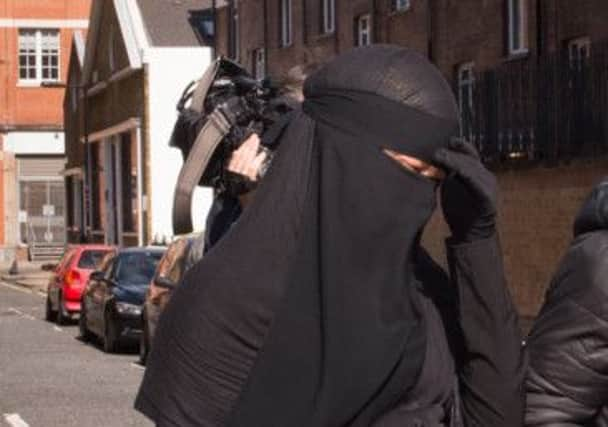Muslim veil is elephant in the court room says judge


The 22-year-old from London, who cannot be named for legal reasons, said it is against her religious beliefs to show her face in public.
But Judge Peter Murphy, sitting at London’s Blackfriars Crown Court, ruled that it was “crucial” for jurors to be able to see the defendant’s face when giving evidence.
Advertisement
Hide AdAdvertisement
Hide AdThe woman, referred to in court as “D”, entered a not guilty plea to a charge of intimidation last week while wearing a niqab after the judge backed down from a previous decision that she would have to show her face to be properly identified.
Presenting his final ruling today, he said there was a “pressing need” to address the issue of whether women involved in proceedings should be allowed to wear veils in court.
He said he “expresses the hope that Parliament or a higher court will provide a definite answer” to the issue soon, adding: “The niqab has become the elephant in the court room.”
“Given the ever-increasing diversity of society in England and Wales, this is a question which may be expected to arise more and more frequently and to which an answer must be provided,” he said.
Advertisement
Hide AdAdvertisement
Hide AdHis judgment came as Home Office Minister Jeremy Browne called for a national debate on whether the state should step in to prevent young women having the veil imposed upon them.
Mr Browne said he was “instinctively uneasy” about restricting religious freedoms, but he added there may be a case to act to protect girls who were too young to decide for themselves whether they wished to wear the veil or not.
Liberty, which campaigns on civil liberties and human rights issues, said it welcomed the ruling.
Director Shami Chakrabarti said: “Credit to Judge Murphy for seeking to balance the freedom of conscience of the defendant with the effective administration of justice.
Advertisement
Hide AdAdvertisement
Hide Ad“He has shown a sensitivity and clarity that can only further build confidence in our courts in Britain’s diverse communities and around the world.”
But Keith Porteous Wood, executive director of the National Secular Society, condemned the decision.
He said: “It is vital that defendants’ faces are visible at all times, including while others are giving evidence, so we regret the judge’s decision not to require this. We will be complaining to the Office of Judicial Complaints and also be asking senior legal officers to make visibility throughout court hearings mandatory, and not subject to judges’ discretion.”
The woman sat listening to the 90-minute judgment from the dock wearing the burka and niqab, with only her eyes visible.
Advertisement
Hide AdAdvertisement
Hide AdJudge Murphy told the packed courtroom there was a strong public interest in women who might be the victims of crime coming forward without the fear that the court process could compromise their religious beliefs and practices.
He said: “In general, the defendant is free to wear the niqab during trial.
“If the defendant gives evidence she must remove the niqab throughout her evidence.
“The court may use its inherent powers to do what it can to alleviate any discomfort, for example by allowing the use of screens or allowing her to give evidence by live link.
Advertisement
Hide AdAdvertisement
Hide Ad“The ability of the jury to see the defendant for the purposes of evaluating her evidence is crucial.”
Judge Murphy said that when the defendant is asked to take off the niqab ahead of giving evidence, she should be given some time to reflect beforehand.
“If she refuses the judge should not allow her to give evidence and must give the jury a clear direction,” he said.
She must also remove it in front of a female police officer or other female witness for the purposes of identification, as she has done so in previous hearings.
Advertisement
Hide AdAdvertisement
Hide AdAlthough a screen will be offered to shield her from public view, she must still be seen by the judge, jury and legal counsel, although she also has the option to give evidence over a live TV link.
The judge said she had only worn the veil since May 2012 but his decision would have been the same if she had worn it for years.
He went on: “I accept for the purposes of this judgment that D sincerely takes the view that as a Muslim woman, she is either not permitted or chooses not to uncover her face in the presence of men who are not members of her close family.
“I have been given no reason to doubt the sincerity of her belief.”
Advertisement
Hide AdAdvertisement
Hide AdThe judge said it was necessary for a democratic society to restrict the rights of a defendant to wear a veil during court proceedings.
“No tradition or practice, whether religious or otherwise, can claim to occupy such a privileged position that the rule of law, open justice and the adversarial trial process are sacrificed to accommodate it,” he said.
“That is not a discrimination against religion, it is a matter of upholding the rule of law in a democratic society.”
Referring to the basic governing principles of the courts, he said there is a “proud record of upholding religious freedoms which are a valued part of our democratic way of life”.
Advertisement
Hide AdAdvertisement
Hide Ad“The court has the utmost respect for all religious beliefs, traditions and practices, and makes no distinction between those of different religious faiths or between those with a religious faith and those with no religious faith,” he added.
Lawyers for the woman had argued that it would breach her human rights and be counter to Britain’s tolerance of Islamic dress to remove her niqab against her wishes.